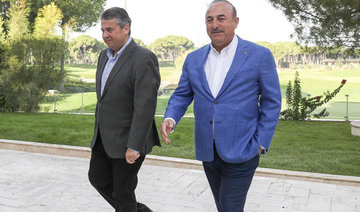ANKARA: Turkish authorities have detained 82 foreigners in Istanbul suspected of having links to the Daesh group and planning to go to Syria, as Turkey’s crackdown against the jihadist group widens.
Police officers have been conducting raids almost daily against Daesh cells across the country, with increasing intensity in the past few weeks.
The state-run Anadolu news agency said the suspects had previously been involved with Daesh fighters in “conflict zones,” and were planning to try to reach Syria “in the coming days.”
Separately, the privately owned Dogan news agency reported that nearly 800 alleged Daesh members had illegally crossed into Turkey from Syria, though it did not say over what period.
Police raided 14 addresses in Istanbul, and also detained 11 other suspects of Syrian origin in the southern city of Adana, Anadolu reported.
The detentions were reported a day after a series of anti-Daesh raids in Ankara during which at least 173 people were detained in operations conducted by 1,500 police officers.
Most of those detained were of Syrian origin, Dogan reported.
The agency added that authorities had carried out Thursday’s raids over fears of an attack on November 10, the date on which Mustafa Kemal Ataturk, father of the modern Turkish republic, died in 1938.
Dozens of people had already been detained in Ankara late last month, some of whom were suspected of planning an attack on Republic Day on October 29.
According to the interior ministry, around 450 suspects were detained on suspicion of helping or being in contact with Daesh in October.
Turkey has suffered a series of terror attacks attributed to Daesh operatives over the past two years, including one on a popular Istanbul nightclub during a New Year 2017 party in which 39 people were killed by an Daesh gunman, Abdulgadir Masharipov.
Masharipov, who was born in Uzbekistan, has confessed to the 2017 attack at the Reina nightclub and will go on trial in Istanbul on Dec. 11.
With Daesh fighters on the run and losing territory in Syria and Iraq, including major cities like Mosul in northern Iraq, there are fears that foreigners who came to fight will pose security risks if they return home.
At least 5,600 citizens or residents of 33 countries have already returned, the Soufan Center, a nonprofit security analysis group, said last month.
Despite a lull in attacks in Turkey since January, tensions remain high as authorities hunt extremist cells across the country.
In the Aegean city of Izmir, seven suspected Daesh members were detained while nine suspects were seized in the northern city of Trabzon, Anadolu said on Friday.
During the Trabzon operation, two guns were found with 159 rounds of ammunition.
Turkey came under attack from Daesh beginning in late 2015 after Ankara allowed the US military to conduct air strikes on Daesh targets in Syria via Turkey’s Incirlik air base.
Turkey had long been one of the main points of passage to Syria for foreigners, especially Westerners, trying to join jihadist groups.
Ankara was previously accused of turning a blind eye and was criticized by its Western allies for not doing enough to fight the Daesh group.
But in August 2016 Ankara launched operation “Euphrates Shield” to support rebels in northern Syria trying to clear the border region of Daesh fighters.
The authorities claimed the operation was a success and ended it in March.
And last month, Turkey entered northwest Syria’s largely jihadist-controlled Idlib Province to form a “de-escalation zone” in the fight against jihadists.
Idlib has been controlled for the past few months by Hayat Tahrir Al-Sham (HTS), a group led by Al-Qaeda’s former Syria affiliate.


























